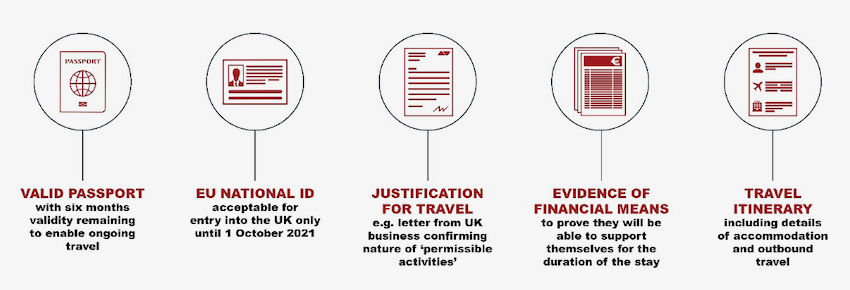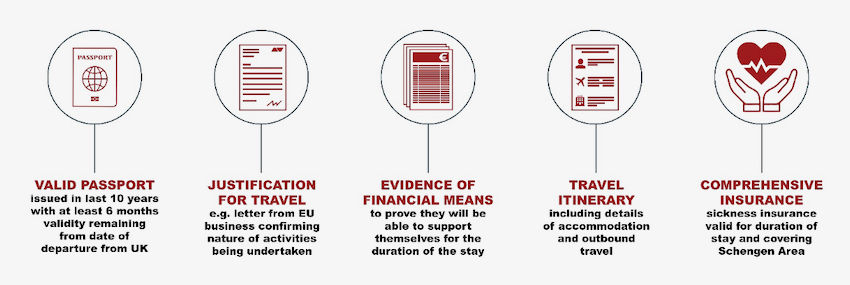Ray Rackham is managing director UK of visas and immigration specialist CIBT
Reports of EU citizens being denied entry to the UK and detained at the border have made the news in recent months, demonstrating the severity of penalties for immigration non-compliance and the risks of undertaking prohibited activities in relation to new post-Brexit travel regulations.
To keep business travel programmes moving successfully in this post-Brexit era as Covid-related travel restrictions slowly ease, it is critical that travel and global mobility managers are familiar with the categories of business-related travel and required document checklists for EU business visitors.
Permissible and prohibited activities
In the post-Brexit world, the three primary categories of work-related travel for employers to consider when sending EU workers to the UK are:
1. Permissible business activities are activities directly linked to an EU national’s overseas employment. These include:
• Attending meetings, conferences, seminars, interviews
• Giving a one-off or short series of talks and speeches provided these are not organized as commercial events and will not make a profit for the organizer
• Negotiating and signing deals and contracts provided any work agreed to is carried out either outside the UK or by UK colleagues with the correct work permission to do so
• Attending trade fairs, for promotional work only provided they are not directly selling
• Carrying out site visits and inspections
• Gathering information for employment overseas, this can include discussions with clients or UK colleagues
• Being briefed on the requirements of a UK based customer provided any work for the customer is done outside the UK
While in the UK, the business visitor can keep in contact with their overseas employer and receive reasonable travel and living expenses from sources in the UK as long as they remain on overseas payroll.
2. Intra-corporate activities are activities undertaken by individuals employed by a group company overseas, who are visiting their UK branch of the business. Engaging in the following permissible intra-corporate activities does not require a work authorisation:
• Advising and consulting, providing this is on internal matters with UK colleagues
• Troubleshooting on internal matters
• Providing training on internal matters (not training to clients)
• Sharing skills and knowledge on a specific internal project with UK employees of the same corporate group provided no work is carried out directly with clients
• As an internal auditor, carrying out internal regulatory or financial audits at a UK branch of the same group of companies as the visitor's employer overseas providing all audits are for internal matters
Intra-corporate activities should:
• Be of short duration (more than one month attracts Home Office suspicion of perceived abuse)
• Be linked to a specific project
• Not involve the visitor directly working with or for clients (the visitor should be based mainly at the UK company offices and not at client sites unless attending meetings with clients)
3. Prohibited activities are activities that cannot be carried out without obtaining a relevant work authorisation prior to arrival in the UK, regardless of the traveller’s duration of stay in the UK. Prohibited activities include, but are not limited to:
• Taking employment in the UK
• Doing work for an organization or business in the UK, including the delivery or receipt of 'on the job' training
• Establishing or running a business as a self-employed person
• Doing a work placement or internship
• Providing temporary cover/short-term cover for a UK role
• Direct selling to the public
• Providing goods and services
Finally, it is important to note that it is often the traveller’s activities that will determine whether they require a work authorisation rather than the time they are likely to spend in country.
As an example, a French employer recently needed to send a group of French nationals to work on a four to six-day project that involved preparing for a livestreamed event to be held in the UK. The travelling group included video producers, project managers, sound engineers and creative directors. The employer conducted an assessment and learned that the French nationals’ visit required work authorisation. As a result, the employer decided to reduce the number of French national employees sent to work on the project in the UK. Instead, they hired British nationals for additional support on the project as they did not require work authorisation to complete the work.
Required document checklists
As the risks for non-compliance can be catastrophic for a business, we recommend that you develop business travel processes that include an activities assessment. This will greatly help business travellers follow regulations and ensure compliance with immigration rules.
Visa-free business travel going both ways between the EU and UK will look very similar, but there are a few key differences in what documents to bring.
EU nationals entering the UK for visa-free business travel should carry the following:

For UK nationals travelling to EU countries for visa-free business travel, document requirements will vary depending on the specific countries to be visited, so it’s important to always check the requirements based on trip specifics. Generally, however, travellers should carry the following:

In both scenarios, travellers should also check the latest health entry requirements prior to travel.
Now, let’s get back to our example from earlier – the travel manager determined that their employees required work authorisation to enter the UK. First, let’s review what 'work authorisations' or 'work permits' are. Note that the two terms are both commonly used but refer to the same item.
Work authorisations allow foreign nationals to conduct activities which are considered productive work in a country (for example, completing day-to-day work activities). Obtaining a work permit is a more complex and time-consuming process than applying for a business visa – more required documents are needed, the process typically includes a series of application steps rather than a single consular visa application, and it is more expensive than getting a business visa.
Again, the foreign national’s activities in a country, not duration of their stay, is the primary determining factor on whether they will require a work permit. This is one of the most significant changes to business travel post-Brexit. For example, a French citizen will typically need a work permit in the UK if they will engage in any work activities, even if their stay will be less than six months.
The UK rolled out a new points-based immigration system on 1 December 2020 which has two primary employer-sponsored routes: 1) Skilled Worker and 2) Intra-Company Transfer. Anyone applying for these routes must meet specific sets of requirements that are assigned a points value. Work authorisation is then awarded to those who gain the required points for the route. The system has been billed as providing flexible arrangements for UK employers to recruit skilled workers from around the world.
A recurring theme that we’re seeing is employers incorrectly assuming that the costs and requirements for work authorisations are similar to those of a business visa. Generally speaking, work authorisation processes involve more steps and filings, require more supporting documents, take longer, and hold more eligibility criteria than a business visa; all of these factors contribute to higher costs.
Adapting to the post-Brexit business travel and immigration landscape – what you can do to prepare
• Allocate budget for work authorisation applications.
• Educate your teams about what a business visitor is lawfully able to do in the UK and in EU member states and when work authorisations may be required.
• Register at immigration authorities in the EU, where this is either required or facilitates easier immigration processes.
• Keep track of, and assess the activities of, all employees regularly travelling in the UK and EU.
• Ensure business visitors in the EU know how to calculate their 90 days in any 180-day period.
• Ensure that you are up-to-date on business permitted activities in light of the EU-UK Trade and Cooperation Agreement.
• Partner with an expert visa and immigration provider you can trust to ensure visa and immigration compliance for your company.